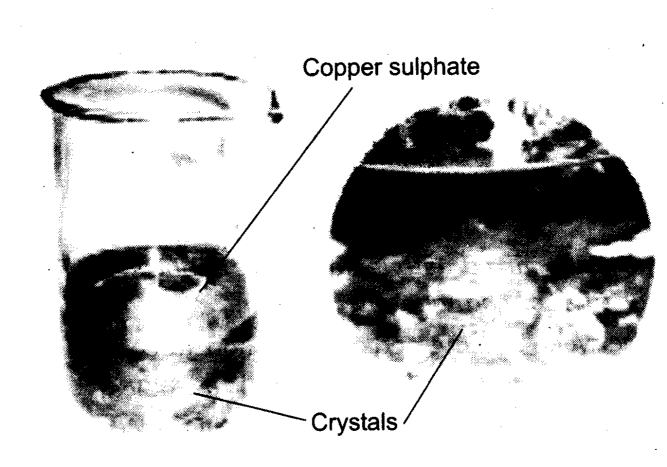NCERT Solutions Class 7 Science Chapter 6 Physical and Chemical Changes
| Section Name | Topic Name |
| 6 | Physical and Chemical Changes |
| 6.1 | Physical Changes |
| 6.2 | Chemical Changes |
| 6.3 | Rusting of Iron |
| 6.4 | Crystallisation |
Q.1.Classify the changes involved in the following processes as physical or chemical changes:
(a) Photosynthesis
(b) Dissolving sugar in water
(c) Burning of coal
(d) Melting of wax
(e) Beating aluminium to make aluminium foil
(f) Digestion of food
Ans.(a) Chemical change (b) Physical change
(c) Chemical change (d) Physical change
(e) Physical change (/) Chemical change
Q.2.(a) Cutting a log of wood into pieces is a chemical change. (True/ False)
(b) Formation of manure from leaves is a physical change. (True/ False)
(c)Iron pipes coated with zinc do not get rusted easily. (True/ False)
(d)Iron and rust are the same substances. (True/ False)
(e)Condensation of steam is not a chemical change. (True/ False)
Ans. (a)False
Correct statement: Cutting a log of wood into pieces is an irreversible physical change.
(b)False
Correct statement: Formation of manure from leaves is a chemical change.
(c) True
(d)False
Correct statement: Iron and rust are two different chemical substances.
(e)True
Q.3.Fill in the blanks in the following statements:
(a) When carbon dioxide is passed through lime water, it turns milky due to the formation of .
(b) The chemical name of baking soda is .
(c) Two methods by which rusting of iron can be prevented are __________ and __________
(d) Changes in which only ____________ properties of a substance change are called physical changes.
(e) Changes in which new substances are formed are called _____________ changes..
Ans. (a)calcium carbonate
(b) sodium hydrogen carbonate
(c) painting or greasing, galvanisation
(d) physical
(e) chemical
Q.4. When baking soda is mixed with lemon juice, bubbles are formed with the evolution of a gas. What type of change is it? Explain.
Ans. The reaction between baking soda and lemon juice can be given as below:
Lemon juice + Baking soda ————-> C02 (bubbles) + Other substances
(Citric acid) (Sodium hydrogen carbonate) (Carbon dioxide)
It is a chemical change
Q.5. When a candle burns, both physical and chemical changes take place. Identify these changes. Give another example of a familiar process in which both the chemical and physical changes take place.
Ans. When a candle burns, both physical and chemical changes occur:
(i) Physical change: melting of wax, vapourisation of melted wax.
(ii) Chemical change: Burning of vapours of wax to give carbon dioxide, heat and light.
LPG is another example in which physical change occurs when LPG comes out of cylinder and is converted from liquid to gaseous state and a chemical change occurs when gas burns in air.
Q.6. How would you show that setting of a curd is a chemical change?
Ans. We can say that setting of curd is a chemical change because we can not get the original substance, i.e., milk back and a new substance is formed with different taste, smell and other chemical properties
Q.7. Explain why burning of wood and cutting it into small pieces are considered as two different types of changes. ~
Ans. Burning of wood is a chemical change because in burning new substances are formed as
Wood + Oxygen ———–> Charcoal + Carbon dioxide + Heat + Light
But cutting it into small pieces is physical change because no new substance is formed. We can only reduce the size of wood.
Q.8. Describe how crystals of copper sulphate are prepared.
Ans. Take a cupful of water in a beaker and add a few drops of dilute sulphuric acid. Heat the water. When it starts boiling, add copper sulphate powder slowly. Continue to add copper sulphate powder till no more powder can be dissolved. .During this process continuously stir the solution. Filter the solution. Leave it for cooling. Look it after some time, you can see the crystals of copper sulphate

Q.9. Explain how painting of an iron gate prevents it from rusting?
Ans. It is known that for rusting the presence of oxygen and moisture is essential. Painting prevents the iron gate from coming in contact with oxygen and moisture.
Q.10. Explain why rusting of iron objects is faster in coastal areas than in deserts.
Ans. As content of moisture in the air in coastal areas is higher than in the air in deserts. So, the process of rusting is faster in coastal areas.
Q.11. The gas we use in the kitchen is called liquified petroleum gas (LPG). In the cylinder it exists as a liquid. When it comes out from the cylinder it becomes a gas (Change- A) then it bums (Change-B). The following statements pertain to these changes. Choose the correct one.
(i) Process-A is a chemical change.
(ii) Process-B is a chemical change.
(iii) Both processes A and B are chemical changes.
(iv) None of these processes is a chemical change.
Ans. (ii) Process-B is a chemical change.
Q.12.Anaerobic bacteria digest animal waste and produce biogas (Change-A). The biogas is then burnt as fuel (Change-B). The following statements pertain to these changes. Choose the correct one.
(i) Process-A is a chemical change.
(ii) Process-B is a chemical change.
(iii) Both processes A and B are chemical changes.
(iv) None of these processes is a chemical change.
Ans.(iii) Both processes A and B are chemical change
<!– –>
Comments are closed